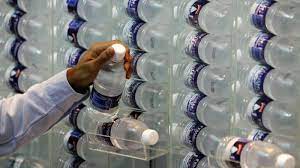New Delhi, Nov 13: Indian Oil Corporation (IOC), the nation’s largest oil firm, will recycle 20 million discarded mineral water, cold drink and other PET bottles annually to make eco-friendly uniforms for staff that man its petrol pumps and LPG distributor agencies, its chairman said.
In a glittering ceremony titled ‘Unbottled – Towards a Greener Future’, IOC Chairman SM Vaidya launched a special ‘sustainable and green’ uniform exclusively designed for nearly 3 lakh fuel station attendants and LPG gas delivery personnel of the company.
“There are 3.1 crore footfalls at our petrol stations every day. We deliver 27 lakh LPG cylinders per day and refuel 3,500 aircraft daily. Our tank trucks traverse 15 lakh kilometres a day. We are there everywhere,” he said at the launch event.
IOC, which meets as much as half of the nation’s fuel needs, has already committed to a net zero emission target by 2046 and is now venturing into recycling PET bottles, he added.
Empty PET packaging discarded by the consumer after use becomes PET waste. IOC will deploy an agency to collect such bottles – 20 million annually – and convert them into yarn to weave or knit fabric. This will then be supplied to a textile company for manufacturing uniforms for IOC’s petrol pump attendants and LPG gas agency staff.
IOC is the first Indian firm to directly venture into the recycling of PET bottles.
The dress materials for these uniforms have been extracted from recycled polyester derived from the processing of used and discarded PET bottles. This initiative would support recycling about 405 tonnes of PET bottles, equivalent to offsetting over 20 million bottles yearly.
Bollywood actor and environmental activist Bhumi Pednekar lent her name to the initiative.
Vaidya said, “These eco-friendly uniforms will shine as our green commitment, and I am delighted that our frontline energy soldiers will don them”.
“About 8 million metric tonnes of plastic enter the ocean annually, and about 150 million metric tonnes circulate in our marine ecosystems. At this pace, by 2050, there will be more plastics in the sea than fish. The conversion of plastic bottles into fabric is a beautiful example of how diligent handling of problems opens doors to new opportunities,” he noted.
Vaidya also spoke of IOC’s other eco-conservation outreaches like concerted drives to protect the Indian Single Horned Rhino and the reintroduction of Cheetahs in Indian forests after they went extinct over seven decades ago.
Bhumi Pednekar, while lauding IOC’s green outreach, said, “Each of us can play a significant role by embracing sustainability as the way of life. As a citizen of the country, I feel proud that the country’s leading energy company is undertaking unique environmental efforts like these. My thanks and compliments to Indian Oil”.
A passionate advocate for the issue of climate change, Pednekar has also started a pan-India campaign Climate Warriors to raise awareness of environmental conservation and inspire citizens to embrace greener lifestyle choices.
Under this green initiative of IOC, used plastic bottles are shredded into flakes and then melted into micro-pellets. These micro-pellets are converted into yarns for weaving these green clothing.
The green impact of this fabric goes even beyond the recycling benefits. The clothes match virgin polyester in quality, but its manufacturing takes significantly fewer resources.
Its production requires almost 60 per cent less energy, and CO2 emissions are reduced by nearly one-third compared to virgin polyester. Even when these clothes wear out, the used Polycotton uniforms can be mechanically recycled and converted into low-end quilts, blankets or even high-end denim fabric. The fabric conforms to Global Recycling Standard Certification. (PTI)
Trending Now
E-Paper


